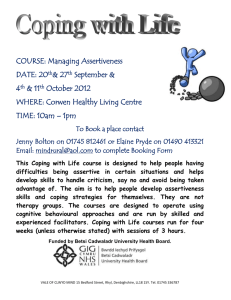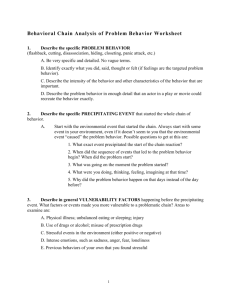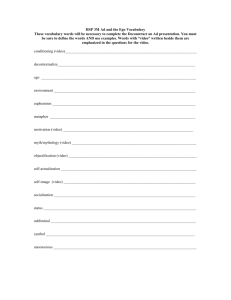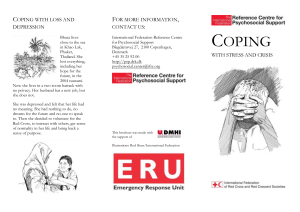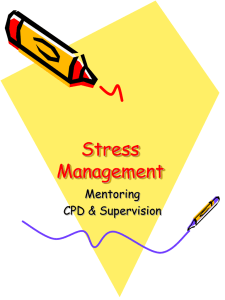Sample - solutionmanual center
advertisement
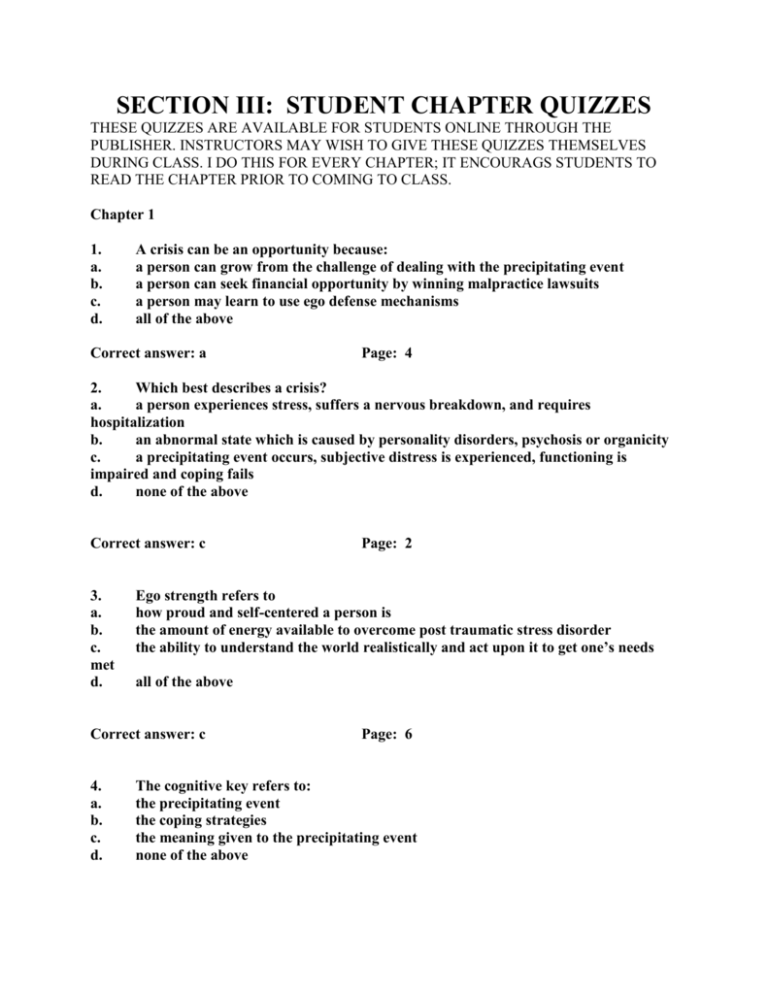
SECTION III: STUDENT CHAPTER QUIZZES THESE QUIZZES ARE AVAILABLE FOR STUDENTS ONLINE THROUGH THE PUBLISHER. INSTRUCTORS MAY WISH TO GIVE THESE QUIZZES THEMSELVES DURING CLASS. I DO THIS FOR EVERY CHAPTER; IT ENCOURAGS STUDENTS TO READ THE CHAPTER PRIOR TO COMING TO CLASS. Chapter 1 1. a. b. c. d. A crisis can be an opportunity because: a person can grow from the challenge of dealing with the precipitating event a person can seek financial opportunity by winning malpractice lawsuits a person may learn to use ego defense mechanisms all of the above Correct answer: a Page: 4 2. Which best describes a crisis? a. a person experiences stress, suffers a nervous breakdown, and requires hospitalization b. an abnormal state which is caused by personality disorders, psychosis or organicity c. a precipitating event occurs, subjective distress is experienced, functioning is impaired and coping fails d. none of the above Correct answer: c 3. a. b. c. met d. Ego strength refers to how proud and self-centered a person is the amount of energy available to overcome post traumatic stress disorder the ability to understand the world realistically and act upon it to get one’s needs all of the above Correct answer: c 4. a. b. c. d. Page: 2 Page: 6 The cognitive key refers to: the precipitating event the coping strategies the meaning given to the precipitating event none of the above Correct answer: c 5. a. b. c. d. Page: 9 Which of the following is not an example of effective coping behaviors? actively exploring reality issues learning to stifle emotions and contain them actively invoking help from others none of the above Correct answer: b Page: 12 SECTION IV: INSTRUCTOR TEST BANK Multiple Choice and True/False Items Chapter 1 1. Ego strength refers to: a. how proud and self-centered the person is b. the amount of energy available to overcome post-traumatic stress disorder c. the ability to understand the world realistically and act upon it to get one’s needs met d. all of the above e. none of the above Correct answer: c Page: 8 2. The outcome of a person’s crisis is determined by his/her: a. material resources b. personal resources c. social resources d. all of the above e. none of the above Correct answer: d 3. The cognitive key refers to: Page: 7 a. b. c. d. e. the precipitating event the coping strategies the meaning given to the precipitating event a and b none of the above Correct answer: c Page: 9 4. Which of the following is not an example of effective coping behavior according to Caplan? a. actively exploring reality issues b. learning to stifle emotions and contain them c. actively invoking help from others d. all of the above e. none of the above Correct answer: b Page: 12 5. An example of effective coping behavior is: a. learning to accept that oneself cannot be trusted in crisis situations b. learning to master the problem as it comes to you as a whole c. mastering feelings where possible d. none of the above Correct answer: c Page: 12 6. The curvilinear model of anxiety proposes that: a. anxiety is always negative and serves no purpose b. anxiety may be used to increase motivation c. anxiety should be avoided at all costs d. none of the above Correct answer: b Page: 10-11 7. Which best describes the trilogy definition of a crisis? a. a person experiences stress, suffers a nervous breakdown, and requires hospitalization b. a precipitating even occurs, subjective distress is experienced, coping fails c. an abnormal state which is caused by personality disorders, psychosis or organicity d. a and b above e. none of the above Correct answer: b Page: 2 8. A crisis can be an opportunity because: a. the person can grow from the challenge of dealing with the precipitating event b. the person can seek financial opportunity by winning malpractice lawsuits or workman’s compensation c. the person may learn to use ego defense mechanism d. all of the above e. none of the above Correct answer: a Page: 4-5 9. A person in crisis may be in danger of: a. becoming psychotic b. committing suicide c. coming through the crisis at a lower level of functioning d. all of the above e. none of the above Correct answer: d Page: 5 10. Which of the following might determine how well someone manages a crisis? a. material resources b. personal resources c. social resources d. all of the above Correct answer: d Page: 7 11. Caplan believed that all but one of the following are characteristics of effective coping behavior: a. actively exploring reality issues b. trusting in oneself c. freely expressing feelings d. none of the above Correct answer: d Page: 12 12. The Crisis-Prone person usually: a. has access to their ego to deal with stress b. has depleted their ego strength and operates defensively c. engages in problem solving behaviors under stress d. all of the above Correct answer: b Page: 6-7 True or False Items: 13. Crises are abnormal and need long term therapy to overcome them. F/p.3 14. The goal of crisis intervention is to change the precipitating event. F/p.3 15. If left untreated, crisis states will usually last about one year. F/p.4 16. Everyone who experiences a stressor in life will succumb to a crisis state. F/p. 6 17. It is possible to grow after effective resolution of a crisis. T/p.4 18. Caplan’s list of effective coping people includes the ability to invoke help from others. T/p.12 19. Ego strength refers to one’s capacity to deal with the demands of reality. T/p.8 20. Cognitive elements are of great importance in crisis work. T/p.9 21. The major goal of crisis intervention is to increase the client’s functioning. T/p.3 22. Situational crises often have an emergency quality to them. T/p.10
